
Isn’t She Great, starring Bette Midler and Nathan Lane, is billed as a biopic about the life and hard-driving times of Jacqueline Susann, but the actual film is something else again. It’s more like a camp fantasia that turns Susann into a naughty-but-nice lollipop who is royally catered to by her gummy-bear-ish husband-press agent Irving Mansfield. The inanity of the project is staggering. At one point, when Susann is in the throes of creation on Valley of the Dolls, she asks her husband if it’s okay to write about orgasms. She might as well be asking him if she can write about waffles. I realize that the filmmakers – director Andrew Bergman and screenwriter Paul Rudnick – were under no obligation to give us the “real” Jacqueline Susann, but it would have helped if they had at least given us the real somebody.
It’s kind of funny reading all the recent stories about Susann being rediscovered as a feminist icon – the high priestess of trash who brought out all the rowdy, lewd stuff in women’s lives that the big-boy pulpsters left out. She and Irving Mansfield are also being credited, if that’s the right term, with starting the whole take-no-prisoners approach to book promotion. Popular culture must be pretty hard-up for heroes these days. Only in a win-win culture like ours – and, more specifically, only in Hollywood – would anyone celebrate a character who says unabashedly, “All I ever wanted was to be famous.” This declaration in the movie is presented with only the lightest of ironies. Fame – any fame – is good.
The success game has never seemed so squeaky-clean. In place of the pill-popping, Pucci-appareled swaggerer who had scads of affairs and worked her personal vendettas into romans à clef, we are given an essentially kindhearted dame whose celebrity was, literally, divinely ordained. The film is punctuated by scenes in which Susann, with Mansfield dutifully in tow, looks up through the trees in her favorite spot in Central Park and talks to God. We’re supposed to find these scenes adorable – God as the ultimate William Morris agent. But we’re also meant to see Susann as essentially child-like – in a good way. She wishes upon a star, and the star twinkles back.
Even her heartbreak twinkles: When her baby boy turns out to be autistic, she’s bummed out but pretty much snaps out of it with the help of her wisecracking actress friend Florence (Stockard Channing). When a lump in her breast is discovered, it’s only a matter of time before we get the scene in which, during treatment, she pulls out a copy of Valley of the Dolls for her radiation technician. I suppose we should be grateful that we’re not watching a big squishy sobfest, but there’s something anaesthetizing about the way everything in this movie – the sorrows as well as the kicks – is made to seem silly.
The skimpiness of the conception extends to the showbiz milieu that the film is supposedly celebrating. The scenes in Lindy’s, for example, might as well be taking place in cloud cuckooland. We don’t get any of the hustle of the Broadway-Hollywood idiom, and the New York book scene is just so much wacky derring-do. John Cleese, whose talent, along with just about everybody else’s, seems to have gone into hibernation during this film, plays the visionary publisher who recognizes the dollar signs embedded in Susann’s wretched prose. Susann’s editor, played by David Hyde Pierce doing his snippy Wasp thing, chafes at that prose until the numbers start racking up; he does a victory jig, which we’re supposed to join in on, when Susann’s sales reach the top of the best-seller list. So much for standards.
As an artist, Bette Midler began her movie career at the top, with a performance in The Rose in which she seemed capable of doing anything. Her raucousness and misery flowed into each other; she was like a free-form force of nature, and it remains one of the finest debut performances in movies. But then her acting career took a sharp turn into blowsy-diva comedy, and as long as she was in films like Down and Out in Beverly Hills or Ruthless People, who could complain? Like Katherine Hepburn, she was a rarity: great in tragedy and great in comedy. But as time went on, Midler’s comic antics turned into shtick, and her tragic force, in movies like Beaches and Stella and For the Boys, dissolved into goop. Playing Jacqueline Susann should have recharged her batteries by indulging her gift for knockabout tragedy, except that the role, as written, is pure piffle. The current resurgence in interest in Susann – the magazine and newspaper articles, the reissues of her best-sellers, and all the surrounding hype – is supposed to be her last laugh on all the denigrators who said she’d be forgotten. But having the trashiness of her life turned into more trash isn’t really much of a way to be remembered.